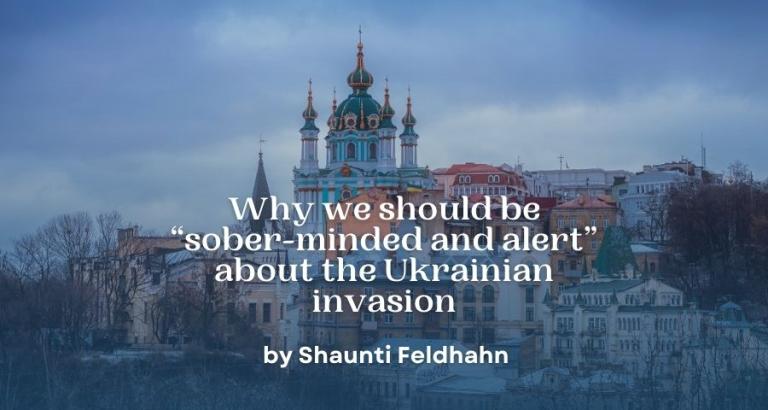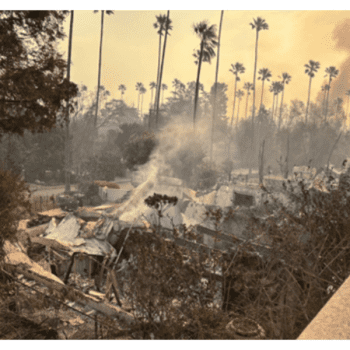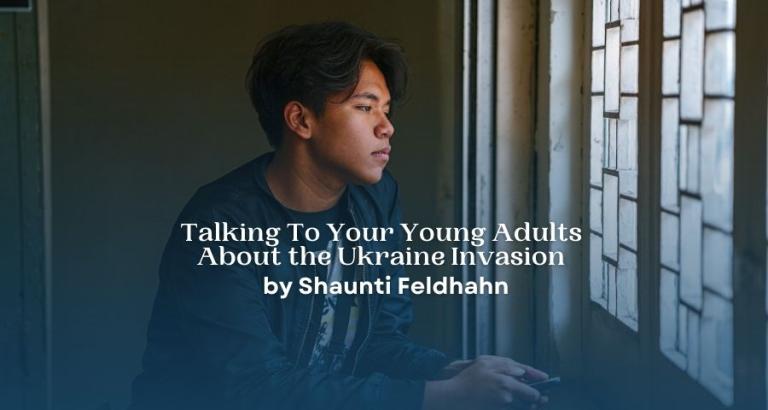
Occasionally something happens in the world that is momentous enough to warrant taking off my “relationship researcher” hat and dusting off my old “public policy hat.” (I have been out of the policy world for a long time, but that’s the field of both my initial professional experience and my graduate degree.) Today’s Russian invasion of Ukraine is one such event.
I believe there is a crucial perspective here for the Christian community to begin to think about (for those who aren’t already). Especially for those of you who are pastors in local churches, and ministry leaders with influence in the life of your community. I’m not a foreign policy expert and I have no special knowledge; I’ve only been reading up on this in news and analysis like everyone else. But if you haven’t been following the news as closely or are simply looking for other perspectives, keep reading. If not, ignore this and I’ll see you in the next “regular” blog!
The U.S. Christian community needs to be aware of just how big of a deal this could be.
Russia’s invasion of Ukraine is a massively destabilizing move that drastically changes the status quo of Europe and NATO for the foreseeable future—and could easily have many unforeseen consequences for the U.S. (And potentially the globe.) This is the first time since World War II that one European state has invaded another with the clear intent to overthrow a democratically elected government and take over the country.
The church in the United States cannot be caught unawares of what this means. We should see this as having been “put on notice” to be extremely alert and praying. What is going on at the moment (e.g. an invasion of one smallish country) could easily become the first chapter of a much, much bigger story. (More on that in a moment.)
I’m soberly reminded of 1 Peter 5:8. “Be sober-minded; be watchful. Your adversary the devil prowls around like a roaring lion, seeking someone to devour.” The enemy is on the move. So must we be, as followers of Jesus.
Russia’s full invasion of Ukraine appears to be the worst-case scenario for now.
While Russian troops were massing on the border and engaging in cyberattacks, there was still a chance that their efforts were going to be limited to extracting diplomatic concessions or “just” taking over the two territories that Russia has wrongly claimed as their own.
No longer. Dozens of Ukrainian cities have been attacked with missiles and airpower, bridges and airports and communication centers have been taken out nationwide, and tanks are en route to the capital. Russia’s President Putin is in full-on dictator-disinformation mode, claiming (inaccurately) that this action is being done to bring peace to the country of Ukraine, stop the “genocide” perpetrated by Ukraine, and “de-nazify” the country. Needless to say, there is no evidence of Ukrainian genocide, and its Jewish president was probably quite surprised to be accused of being a Nazi regime.
The invasion could have many consequences for the U.S.
To be clear: There is no discussion of sending U.S. or NATO troops to militarily defend Ukraine itself. (One reason for this whole thing is that the country is not part of the NATO treaty and Putin wanted to make sure that never changed). So it is easy to think that this conflict will be limited in scope.
It could indeed be limited in scope (if we view a hostile overthrow of a democratic European country as “limited”) . . . but it could just as easily spread to a major conflict between great powers. Great powers with nuclear weapons. And at the moment, Putin—the holder of many of those nuclear weapons- appears to be acting extremely erratic. In his speech overnight that declared war on Ukraine, he was visibly agitated as he said “Whoever tries to interfere with us, and even more so to create threats to our country, to our people, should know that Russia’s response will be immediate and will lead you to such consequences as you have never experienced in your history. We are ready for any development of events. . . . I hope that I will be heard.”
It is almost certain that the next step in U.S. action will be punishing sanctions (which are likely to be announced by the time this is posted). But it is highly likely that that will not be the only step. And here’s where it begins to get really dicey. It is also highly likely that Ukraine’s NATO-member neighbors will be looking to NATO for military support. After all, those neighbors now feel legitimately threatened and will want to bulk up forces on their borders. And of course, the U.S. is bound by NATO to be a part of that.
So what happens if Russia sees that “protective troop buildup” as threatening (which Putin already has seen that way, since it was the original pretext for building up his forces), and threatens some sort of retaliation? What happens if an increasingly paranoid Putin actually orders a military action against a NATO ally? We are bound to defend NATO allies with our own troops.
Once we hit that tipping point where Russian troops are attacking U.S. troops . . . well, you can see why this could be a big, big deal. What happens if Russia’s erratic leader begins considering whether a first-strike nuclear attack with a new hypersonic missile (which our systems can’t easily defend against) might actually be worth it?
Even more likely: what happens if posturing and threats begin filling the airwaves with speculation and worry? What happens if every television news anchor begins inviting experts on to talk about how nuclear weapons work, or about whether Putin really is a madman? Are we as a church prepared to help one another respond to such anxiety with peace and trust—or will we be part of the problem for a while as we give into the temptation to speculation and worry?
I grew up during the last years of the Cold War, watching 1980’s movies like The Day After about what would happen if nuclear weapons were ever used. There was always so much anxiety in the background. I remember as a young professional working on Capitol Hill watching the news live as the Berlin Wall fell—the precursor to the end of the Cold War. The world suddenly felt so much more secure.
Yet followers of Christ should know in advance that any earthly security is truly an illusion. We have a responsibility to make the church—especially those in younger generations, who have never lived through a harrowing event of this nature—aware of what is actually going on and prepare to respond in faith. We have a responsibility to help the church be sober and alert, ready in prayer. Believers should never be taken by surprise.
And believers should never be panicked. God is on His throne. He calls us to be people of peace in the storm. So now is the time for followers of Christ to trust Him and learn from Him in a whole new way. Now is also the time to be praying for protection for those in harm’s way, as well as praying for wisdom for all leaders involved in the response. This is an important season ahead. Let’s meet it well.

Shaunti Feldhahn is a social researcher and best-selling author on relationships. Back in the day she worked on Capitol Hill and earned a Master in Public Policy from Harvard University. See more at shaunti.com.












